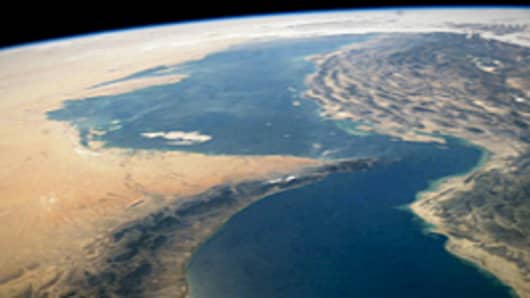Ratings agency Standard and Poor’s (S&P) on Tuesday pointed to increased risks for issuers in the Middle East as the spiraling tensions between Iran and the West showed no sign of slowing down. Although the agency believed that the risks were already accounted for in its current ratings, it cautioned that a reassessment depended on how the situation developed.
Late on Monday, Iran renewed its threat to close the Strait of Hormuz, one of the world’s most important seaborne energy chokepoints. Commander of the Islamic Revolution Guard Corps (IRGC), Mohammad Jafari, was quoted by state-run Press TV as saying that "intelligent control of the Strait of Hormuz" was Iran’s strategy to deal with existing sanctions.
It was not immediately clear how, or when, they planned to implement the tactic, but the comments coincide with S&P’s impression that Iran could respond with "low-scale provocations", such as hindering the timely passage of tankers by introducing inspections or boarding merchant ships.
Iran has threatened to close the waterway on countless occasions over decades of a difficult relationship with the United States. On December 27, 2011, Iran’s Vice First Vice President Mohammad-Reza Rahimi warned that "not even one drop of oil will be allowed through the Strait of Hormuz", should sanctions be slapped on Iran. Still, significantly widened sanctions were adopted by the United States on December 31, and by the European Union on January 23 of this year. EU imports of Iranian oil are expected to be wound down in time to comply with a ban that comes into effect on July 1, 2012.
"So far, these threats have been verbal, but analysts are not ruling out the possibility that the current exchanges of rhetoric could spark disruptions to trade flowing through the Strait, or even in an extreme scenario, military confrontation" S&P added.
Although the agency saw a "very low likelihood of a severe disruption of oil supplies", the potential ramifications would present "a worrying specter" in a time of global economic fragility. The IEA said in its monthly oil report last week that Iran’s production, OPEC’s second largest, had remained unchanged at 3.45 million barrels per day in December compared to a month earlier.
Foreign Minister of NATO member Turkey, Ahmet Davutoglu, also reiterated the importance of a dual-track strategy during a meeting with U.S. Secretary of State Hilary Clinton in Washington.
"I have said many times from this podium and elsewhere we recognize Iran’s right to peaceful nuclear energy, but Iran also has international responsibilities that we expect it to live up to," he told reporters.
Turkey imports an estimated 30 percent of its crude needs from Iran, with which it shares a border, but that is less than half of the volume China imported based on 2011 data. Those relations will come under renewed scrutiny, with China’s Global Times newspaper reporting on Tuesday that Iranian President Mahmoud Ahmadinejad would travel to Beijing by mid-March to discuss the sanctions and its nuclear program.
Meanwhile, Israel has blamed Iran and its allies for being behind the recent attacks on Israeli diplomats in India and Georgia. Prime Minister Benjamin Netanyahu said that Israel would "operate methodically and patiently against international terror that originates in Iran". The claim has been rejected by Iranian authorities.


